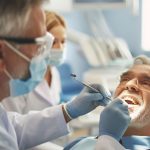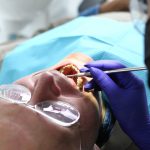It’s no secret that dental plaque, oral bacteria and gum disease can affect your heart health. For many years now there has been a link between what’s happening in your mouth and your risk of cardiovascular disease.
It all starts off with a buildup of dental plaque. When the plaque and bacteria escape into your bloodstream, it damages blood vessels, contributes to the buildup of arterial plaque and can even result in blood clots.
Worse, gum disease is a source of chronic inflammation that spreads throughout your body. If you’ve been keeping up with my news articles, you know inflammation is a key factor in heart disease.
What you may not realize is the role your teeth and gums might play in other areas of your health.
Your Mouth Has Its Own Microbiome
The threat posed by your oral microbiome – which is very similar to your gut microbiome – goes well beyond a radiant smile, and well beyond your cardiovascular health.
For example, oral bacteria have been found in liver disease, cancers and in the brains of people have had a stroke or died with Alzheimer’s disease.
Bacteria from the mouth can affect your blood sugar levels and your risk of type 2 diabetes. (However, better oral health can help people with diabetes control blood sugar levels.)
Additionally, these same bacteria can damage the kidneys. (On the other hand, people who brush three or more times a day show a much lower risk of developing chronic kidney disease.)
Not only that, oral microbes even contribute to your odds of erectile dysfunction by around 150%. (But appropriate periodontal treatment can improve erectile function.)
To top it off, people who rate their oral health as poor or fair are more likely to die prematurely! (Compared to those who have good or excellent oral health.)
This makes appropriate dental care a very important part of living a long and healthy life.
Save Your Teeth, Save Your Life
It’s not hard to take care of your teeth, and it can help ward off all sorts of health problems as you age. Here’s all it takes…
Brush your teeth for two minutes, at least twice a day. These days everyone is in a hurry. They run the toothbrush over their teeth for 10 or 20 seconds and they’re done. But that’s not enough to defeat the bacteria in your mouth.
Two minutes of brushing with a soft, small-headed toothbrush will clear out most of the bacteria and debris that cause plaque build-up and gingivitis.
Also, for the most benefit, I suggest using a natural toothpaste that doesn’t contain fluoride.
Always floss AFTER brushing. There are many places between the teeth that your toothbrush misses. So flossing is an important part of your daily oral care.
But if you floss before you brush, you’ll end up pushing bacteria down into your gums. And your toothbrush can’t reach into those hidden nooks and crannies. So brush first, then floss.
I’ve also added a water pic to my regimen, which I’ve been using for a while now. It uses a jet of water to irrigate all of those tight spaces and crevices that even floss can’t reach. I highly recommend investing in one.
Rinse with a natural mouthwash. Rinsing is an important part of your daily oral regimen. But I’m not crazy about commercial mouthwashes. Instead, I suggest opting for a natural, herbal-based dental rinse. Look for products that do not contain fluoride, alcohol or saccharin. Or you can always make your own.
Practicing these healthy oral habits can go a long way when it comes to saving your teeth, preserving your smile, and protecting your long-term health.
Bush, floss, rinse… and make sure to schedule regular cleanings and check-ups with your dentist!
SOURCES:
Patrakka O, Pienimäki JP, Tuomisto S, Ollikainen J, Lehtimäki T, Karhunen PJ, Martiskainen M. Oral Bacterial Signatures in Cerebral Thrombi of Patients With Acute Ischemic Stroke Treated With Thrombectomy. J Am Heart Assoc. 2019 Jun 4;8(11):e012330.
Peng X, Cheng L, You Y, Tang C, Ren B, Li Y, Xu X, Zhou X. Oral microbiota in human systematic diseases. Int J Oral Sci. 2022 Mar 2;14(1):14.
Mao S, Huang CP, Lan H, Lau HG, Chiang CP, Chen YW. Association of periodontitis and oral microbiomes with Alzheimer’s disease: A narrative systematic review. J Dent Sci. 2022 Oct;17(4):1762-1779.
Long J, Cai Q, Steinwandel M, Hargreaves MK, Bordenstein SR, Blot WJ, Zheng W, Shu XO. Association of oral microbiome with type 2 diabetes risk. J Periodontal Res. 2017 Jun;52(3):636-643.
Simpson TC, Clarkson JE, Worthington HV, MacDonald L, Weldon JC, Needleman I, Iheozor-Ejiofor Z, Wild SH, Qureshi A, Walker A, Patel VA, Boyers D, Twigg J. Treatment of periodontitis for glycaemic control in people with diabetes mellitus. Cochrane Database Syst Rev. 2022 Apr 14;4(4):CD004714.
Chang Y, Lee JS, Woo HG, Ryu DR, Kim JW, Song TJ. Improved oral hygiene care and chronic kidney disease occurrence: A nationwide population-based retrospective cohort study. Medicine (Baltimore). 2021 Nov 24;100(47):e27845.
Farook F, Al Meshrafi A, Mohamed Nizam N, Al Shammari A. The Association Between Periodontitis and Erectile Dysfunction: A Systematic Review and Meta-Analysis. Am J Mens Health. 2021 May-Jun;15(3):15579883211007277.
Eltas A, Oguz F, Uslu MO, Akdemir E. The effect of periodontal treatment in improving erectile dysfunction: a randomized controlled trial. J Clin Periodontol. 2013 Feb;40(2):148-54.






